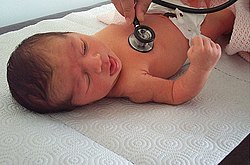Pediatric medicine

A doctor examines a newly born baby.
|
|
| Focus | Children and adolescents |
|---|---|
| Subdivisions | Pediatric cardiology, neonatology, pediatric emergency medicine, pediatric oncology, among others |
| Significant diseases | Congenital diseases, Infectious diseases, Childhood cancer |
| Significant tests | World Health Organization Child Growth Standards |
| Specialist | Pediatrician |
 |
|
| Occupation | |
|---|---|
| Names |
|
|
Occupation type
|
Specialty |
|
Activity sectors
|
Medicine |
| Description | |
|
Education required
|
|
|
Fields of
employment |
Hospitals, Clinics |
Pediatrics (also spelled paediatrics or pædiatrics) is the branch of medicine that involves the medical care of infants, children, and adolescents. The American Academy of Pediatrics recommends people be under pediatric care up to the age of 21. A medical practitioner who specializes in this area is known as a pediatrician, or paediatrician. The word pediatrics and its cognates mean "healer of children"; they derive from two Greek words: (pais "child") and (iatros "doctor, healer"). Pediatricians work both in hospitals, particularly those working in its specialized subfields such as neonatology, and as primary care physicians.
Pediatrics is known as a new modern medicine in society today.Hippocrates, Aristotle, Celsus, Soranus, and Galen, understood the differences in growing and maturing organisms that necessitated different treatment: Ex toto non sic pueri ut viri curari debent ( "In general, boys should not be treated in the same way as men." Celsus).
Some of the oldest traces of pediatrics can be discovered in Ancient India where children's doctors were called kumara bhrtya.Sushruta Samhita an ayurvedic text, composed during the sixth century BC contains the text about pediatrics. Another ayurvedic text from this period is Kashyapa Samhita.
...
Wikipedia
